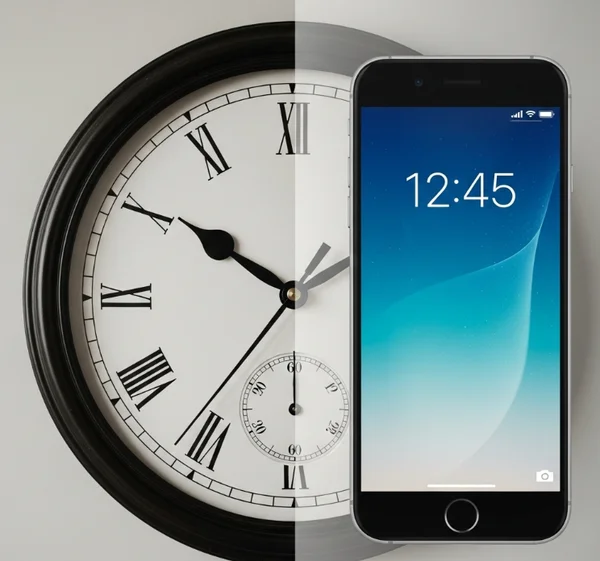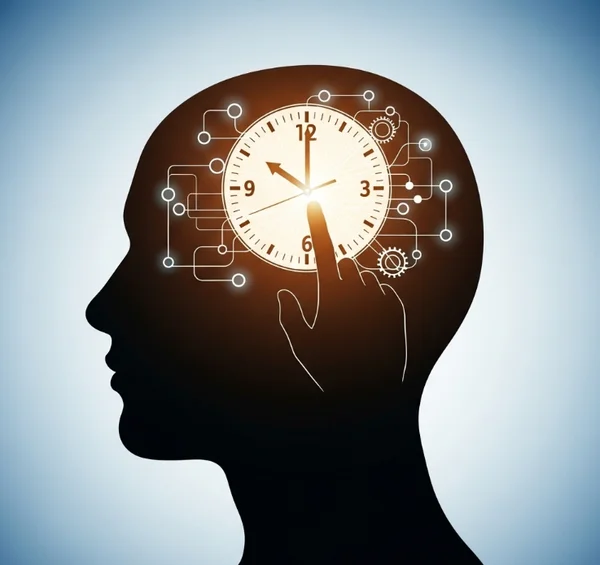Analog Clocks Obsolete? Why They Aid Brain Development
June 9, 2025 | By Aisha Bennett
In an era dominated by digital screens and instant information, a common question arises: Are analog clocks obsolete? With smartphones, smartwatches, and countless digital displays telling us the time with precise numerals, do we still need those traditional clocks with moving hands? This article argues that the analog clock importance extends far beyond mere timekeeping. We'll explore the significant cognitive benefits analog clock use offers, particularly for analog clock brain development and learning, and why teaching analog clocks remains a valuable practice. Understanding these benefits can be especially relevant when considering cognitive skill development, an area explored by tools like the dyscalculia test.
The "Are Analog Clocks Obsolete?" Debate in Our Digital World

Do we still need analog clocks when digital alternatives are so readily available? Let's acknowledge the context.
The Rise of Digital Time and Its Impact on Daily Life
Digital clocks offer undeniable convenience: they are easy to read at a glance and often integrated into devices we use daily. This has led many to rely solely on digital time, making the question of analog clock importance a valid one.
Why Some Believe Analog Clocks Are a Thing of the Past
Arguments against analog clocks often cite the initial learning curve for reading them and the perceived efficiency of digital displays. Some view them as quaint relics of a bygone era.
Reconsidering the Analog Clock Importance
However, dismissing analog clocks as obsolete overlooks their unique contributions to cognitive function and learning – benefits that digital clocks don't replicate in the same way.
More Than Just Hands: Unpacking Analog Clock Brain Development Benefits

How do analog clocks help brain development? The engagement required to read an analog clock actively stimulates various cognitive processes.
Enhancing Spatial Reasoning with the Analog Clock Face
One of the most significant cognitive benefits analog clock use provides is the development of spatial reasoning clock skills. This involves:
- Visualizing angles, fractions, and relationships: Understanding the position of the hour and minute hands relative to each other and the numbered dial.
- Mentally processing the circular layout and the movement of the hands helps build critical visual-spatial skills development.
Developing Estimation Skills and a Sense of Time Flow
Unlike digital clocks that present a static number, analog clocks offer a visual representation of time passing. This aids in:
- Understanding "before," "after," and duration intuitively: One can see how much time is left until the next hour or how much has passed.
- Developing time estimation skills, crucial for planning and daily functioning. This helps foster better telling time skills overall.
Strengthening Number Sense and Early Math Concepts
Reading an analog clock reinforces fundamental math concepts analog clock use supports:
- Counting by fives: The minute hand requires counting in five-minute intervals.
- Understanding the 60-base system: Grasping that an hour has 60 minutes and a minute has 60 seconds.
- Visualizing fractions (quarter past, half past). These all contribute to a stronger number sense clock connection.
Improving Concentration and Reducing Digital Distractions
An analog clock is a focused, single-purpose tool. Checking the time on an analog clock is less likely to lead to the myriad distractions a smartphone (which also tells digital time) might offer, potentially improving focus analog clock interaction encourages.
The Learning Benefits of Teaching Analog Clocks to Children

Why teach analog clocks to children in this digital age? The learning benefits clock use offers are substantial.
Building Foundational Time Concepts and Vocabulary
Learning to read an analog clock helps children grasp foundational time concepts like:
- The cyclical nature of time.
- Specific time vocabulary such as "o'clock," "half past," "quarter past," and "quarter to."
Supporting Executive Function Skills Through Time Management
The visual representation of time on an analog clock can aid in developing executive function time management skills:
- Planning and anticipating with visual time cues: Children can better visualize how much time they have for a task.
- This helps in learning to manage their time more effectively.
Aiding Children with Learning Differences: A Tool for Support?
For some children with learning differences, the visual and kinesthetic aspects of a traditional clock (especially a hands-on teaching clock) can be beneficial. The spatial nature might resonate differently than abstract numbers. Understanding these learning tools is key. For individuals who struggle with numerical concepts, sometimes explored through a dyscalculia screening on dyscalculiatest.com, alternative ways of representing information can be supportive.
Analog Clocks: Still Relevant for Adults and Lifelong Learning
The benefits aren't limited to children. What are the benefits of analog clocks for adults?
Maintaining Cognitive Agility Through Analog Time Reading
Regularly engaging in tasks that require mental processing, like reading an analog clock, can contribute to cognitive agility in adults. It's a small but consistent way to exercise the brain.
The Aesthetic and Psychological Comfort of Analog Clocks
Many find the gentle sweep of analog clock hands aesthetically pleasing and psychologically calming compared to the starkness of digital displays. It can promote a more mindful timekeeping experience.
Practical Uses Beyond Just Telling Time
Analog clocks are often preferred in certain professional settings (e.g., for timing specific intervals in experiments or presentations where a visual sweep is helpful) and remain a staple in interior design.
Why Analog Clocks Still Hold a Valuable Place in Our Lives
So, are analog clocks obsolete? Far from it. While digital time serves its purpose, the unique cognitive benefits analog clock use provides for analog clock brain development, spatial reasoning, number sense, and understanding the flow of time make them an invaluable tool for learning and maintaining cognitive health. Their analog clock importance lies not just in telling time, but in how they make us think about time. They are more than just timekeepers; they are subtle cognitive trainers.
Do you think analog clocks are still important? Why or why not? Share your perspective in the comments!
Frequently Asked Questions about the Importance of Analog Clocks
Do we really still need to teach children to read analog clocks?
Yes, many educators and cognitive scientists argue that teaching analog clocks is still crucial. The learning benefits clock interaction offers, such as developing spatial skills, number sense, and a conceptual understanding of time, are significant for a child's overall cognitive development.
How exactly does an analog clock help with spatial reasoning?
Reading an analog clock requires interpreting the angles between the hands, understanding their position relative to the 12 numbers arranged in a circle, and mentally visualizing fractions of that circle (e.g., a quarter or half). This constant engagement with spatial relationships strengthens spatial reasoning clock skills.
Are there studies supporting the cognitive benefits of analog clocks?
Yes, while direct "analog clock vs. digital clock" A/B test studies on long-term cognitive development might be nuanced, numerous studies support the importance of developing spatial reasoning, number sense, and estimation skills for academic success and overall cognitive function – all of which are exercised by reading analog clocks. The foundational skills analog clocks help build are well-researched.
Can using analog clocks help individuals with dyscalculia?
For some individuals with dyscalculia, the visual and often more concrete representation of time on an analog clock (especially a geared teaching clock where hand movements are linked) can be less abstract than digital numbers. It can help build a better sense of time duration and fractions. However, the core numerical and spatial challenges of dyscalculia might still make it difficult. Understanding an individual's specific cognitive profile through an assessment like the Dyscalculia Test can help determine the most effective supportive strategies, which might include using analog clocks in a targeted way.